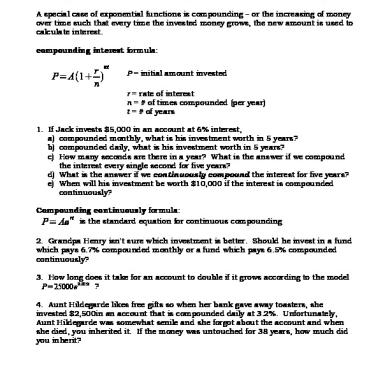Pc Compound Interest
This document was uploaded by user and they confirmed that they have the permission to share it. If you are author or own the copyright of this book, please report to us by using this DMCA report form. Report DMCA
Overview
Download & View Pc Compound Interest as PDF for free.
More details
- Words: 425
- Pages: 9
Compound Interest
MATH PROJECT
COMPOUND INTEREST The formula for compound interest (interest paid on both principal and interest) is an important application of exponential functions. The amount A after t years due to a principal P invested at an annual interest rate r compounded n times per year is r A = P ⋅ 1 + n
nt
EXAMPLES 1. Suppose $1000 is deposited in an account paying 8% per year. How much money will be in the account after 7 years if interest is compounded (a) yearly, (b) quarterly, (c) monthly, (d) daily, (e) 1000 times a year, (f) 10,000 times a year? 2. Suppose $4000 is deposited in an account paying 6% interest compounded monthly. How long will it take for there to be $15,000 in the account?
CONTINUOUS COMPOUNDING As you noticed in Example 1 on the previous slide, when the number of compounded periods increases, the accumulated amount also increases but appears to approach some value. As the number of compounding periods approaches ∞, we say the interest is compounded continuously. The amount A after t years due to a principal P invested at an annual interest rate r compounded continuously is A = Pert.
EXAMPLES 3. Fred an Jane Sheffey have just invested $10,000 in a money market account at 7.65% interest. How much will they have in this account in 5 years if the interest is compounded continuously? 4. You put $5,000 in the bank at an annual interest rate is 12% compounded continuously. (a) Find a formula for the amount in the bank after t months. (b) Use your answer to part (a) to find the amount of money in the bank after 7 months.
EFFECTIVE RATE OF INTEREST The effective rate of interest for an investment is the percentage rate that would yield the same amount of interest if the interest were compounded annually.
PRESENT VALUE The present value of A dollars to be received at a future date is the principal that you would need to invest now so that it would grow to A dollars in the specified time period.
PRESENT VALUE (CONCLUDED) The present values P of A dollars to be received after t years, assuming a per annum interest rate r compounded n times per year, is − nt
r P = A ⋅ 1 + . n If the interest is compounded continuously, then P = Ae−rt.
EXAMPLE 5. Find the principal needed to get $75 after 3 years if the interest is 8% compounded quarterly.
MATH PROJECT
COMPOUND INTEREST The formula for compound interest (interest paid on both principal and interest) is an important application of exponential functions. The amount A after t years due to a principal P invested at an annual interest rate r compounded n times per year is r A = P ⋅ 1 + n
nt
EXAMPLES 1. Suppose $1000 is deposited in an account paying 8% per year. How much money will be in the account after 7 years if interest is compounded (a) yearly, (b) quarterly, (c) monthly, (d) daily, (e) 1000 times a year, (f) 10,000 times a year? 2. Suppose $4000 is deposited in an account paying 6% interest compounded monthly. How long will it take for there to be $15,000 in the account?
CONTINUOUS COMPOUNDING As you noticed in Example 1 on the previous slide, when the number of compounded periods increases, the accumulated amount also increases but appears to approach some value. As the number of compounding periods approaches ∞, we say the interest is compounded continuously. The amount A after t years due to a principal P invested at an annual interest rate r compounded continuously is A = Pert.
EXAMPLES 3. Fred an Jane Sheffey have just invested $10,000 in a money market account at 7.65% interest. How much will they have in this account in 5 years if the interest is compounded continuously? 4. You put $5,000 in the bank at an annual interest rate is 12% compounded continuously. (a) Find a formula for the amount in the bank after t months. (b) Use your answer to part (a) to find the amount of money in the bank after 7 months.
EFFECTIVE RATE OF INTEREST The effective rate of interest for an investment is the percentage rate that would yield the same amount of interest if the interest were compounded annually.
PRESENT VALUE The present value of A dollars to be received at a future date is the principal that you would need to invest now so that it would grow to A dollars in the specified time period.
PRESENT VALUE (CONCLUDED) The present values P of A dollars to be received after t years, assuming a per annum interest rate r compounded n times per year, is − nt
r P = A ⋅ 1 + . n If the interest is compounded continuously, then P = Ae−rt.
EXAMPLE 5. Find the principal needed to get $75 after 3 years if the interest is 8% compounded quarterly.
Related Documents

Pc Compound Interest
May 2020 12
Compound Interest
December 2019 27
Compound Interest
October 2019 26
Simple And Compound Interest
July 2020 11
Compound Interest Problems
December 2019 17
22.compound Interest
June 2020 7More Documents from ""

Pc Intersections Of Lines
May 2020 9
Pc Intro To Sequences
May 2020 13
Text 9. Factoring
May 2020 12
Pc Linear Programming
May 2020 17
Pc Graph Rational Functns
May 2020 9